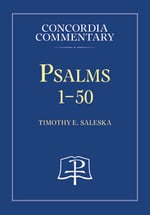If you are a pastor, when was the last time you preached on one of the Psalms? If you are not a pastor, when was the last time you heard a sermon on one of the Psalms? Is it just me, or are the Psalms often overlooked and underused in preaching? I began to notice this several years ago and found I was not alone. Others had noticed a lack of Psalms sermons too.
Poetry of the Psalms
Yet, there is one occasion where the Psalms are frequently preached upon: funerals. Of the merely dozen or so sermons I have heard on the Psalms, more than half have been at funerals. Why would funerals lead us to preach on the Psalms more than on other occasions?
As I pondered these questions, Rev. Dr. Timothy E. Saleska’s commentary on Psalms 1–50 was published. This is an extraordinarily helpful commentary. Saleska sheds some light on my ponderings in the introduction: “readers testify that poetry is very powerful in its ability to give a voice to what lies inside us. In other words, we read poetry with the expectation that it can help articulate our inner life, especially when we lack the language and the ability to do it ourselves.” 1
The Psalms are poetry (as are many other portions of the Scriptures). Poetry often articulates deep emotion that is difficult to express. Saleska also writes that “poetry in general … is a powerful means for dealing with grief and deep loss. It is not surprising that poets, including the psalm authors, deal with the deepest human emotions in their poetry.” 2
It begins to make sense why funerals are a fitting time for us to reflect on the poetry of the Scriptures. As we suffer the pain of grief and loss, our words fail us. Again, Saleska says, “For example, pastors and spiritual caregivers know that people who are suffering can lose their language.” 3
Pastors, deaconesses, and other spiritual caregivers will see this as they visit hospital bedsides and the living rooms of those whose language has been stolen by grief and pain. The Psalms are a rock and refuge in such situations. In such pastoral care situations, I will read familiar, comforting texts such as Psalm 23, Psalm 46, and Psalm 121.
But I will also read a few verses of painful psalms, like Psalm 69:
Save me, O God! For the waters have come up to my neck. I sink in deep mire, where there is no foothold; I have come into deep waters, and the flood sweeps over me. I am weary with crying out; my throat is parched. (Psalm 69:1–3)
And Psalm 102:
My heart is struck down like grass and has withered; I forget to eat my bread. (Psalm 102:4)
As we provide spiritual care, we see the power of the Psalms to articulate language that has been lost through grief and suffering. As we go through personal challenges and suffering, we may likewise turn to the pages of the Psalms to find comfort and hope.
So why are the Psalms not a more regular part of our preaching diet? I do not know, but I would encourage us to spend more time in the Psalms in our daily devotions and in preaching.
There is great suffering in the world right now. Throughout the days of the COVID-19 pandemic, people have lost their lives, their health, their jobs, their connections with other people, their ability to celebrate major life events, and so much more. At the same time, racial and political conflicts have borne the rotten fruit of hatred and violence. These situations have left many of us without language.
In these days of suffering, now seems like a good time to consider preaching on the Psalms with more frequency. Who better to poetically articulate the suffering and grief of these days than the Holy Spirit and the authors He inspired?
Although I highly encourage you to pick up Saleska’s commentary as an incomparable aid to help with the task of preaching on the Psalms, here are a few gems from Saleska that I have found helpful as I have prepared to preach on the Psalms:
Consider the metaphors being used.
Psalms make copious use of metaphors and other linguistic techniques. When you come across a metaphor, sit with it for a while. Play out the ramifications of the metaphor by asking lots of questions. What does it mean when Psalm 23 calls the Lord “my shepherd”? What do shepherds do for sheep? (They protect them, lead them, retrieve them when they’re lost.) What do shepherds protect sheep from? (Wild animals, starvation, one another, the sheep’s own stupidity.) How does God protect me from these things?
Such reflection and contemplation can bear much fruit as we are led to consider God’s love and care for us—and just how vast and potent and multifaceted His love is.
Try not to aim for one correct interpretation.
“We read poetry with the expectation that meaning will take many directions. We expect that the Psalms will offer us any number of interpretive possibilities. So we are on the lookout for (and are satisfied to find) ambiguities, ironies, paradoxes. From one end of a Psalm to the other, there are all kinds of things to see and think about. This is not a problem (instead, it’s a pleasure) if we remember that one vital purpose of the Psalms is to enable us to reflect deeply on the complex and many-sided nature of truth, to contemplate life’s paradoxes, and to give voice to our—often conflicting—emotions and experiences. These texts can open up conversations around the important theological and anthropological questions they raise.” 4
When it comes to interpreting Scripture, we are often on the lookout for the one right answer. The Psalms (and scriptural poetry in general) are not interested in narrowing or constricting meaning but in broadening meaning as they explore the truths about God and being His people.
Pay attention to the emotions of the Psalm and the emotions inside of you.
This can be a challenging task. Emotions are a blessing from God, and yet emotions can also be misused to justify all sorts of sin. Still, ignoring emotions is also dangerous, as emotions are part of the human experience. Saleska writes, “In addition to providing language that people can relate to on an emotional and relational level, readers have also read the Psalms in such a way as to be formed by them.” 5
One of the ways we avoid letting our emotions lead us down unfaithful paths is by seeing how the Scriptures deal with deep emotions, by letting the Scriptures form us as they lead us on paths of faithfulness.
Saleska points to Luther as an example of this as Luther says, “we should adapt and adjust our minds and feelings so that they are in accord with the sense of the psalms.” 6
Psalms frequently walk us from grief to praise amid suffering. They do not sugarcoat or hide suffering. The Psalms name suffering and feel it and confess it to God. In reading, praying, and reflecting on the Psalms, we are led on a journey of faithfulness.
 Whether you have preached extensively on the Psalms or not at all, Dr. Tim Saleska’s commentary will be of help to you as you endeavor to proclaim the Good News of Christ to a suffering world.
Whether you have preached extensively on the Psalms or not at all, Dr. Tim Saleska’s commentary will be of help to you as you endeavor to proclaim the Good News of Christ to a suffering world.
1 Timothy E. Saleska, Psalms 1–50, Concordia Commentary (Saint Louis: Concordia Publishing House, 2020), 28–29.
2 Ibid, 22.
3 Ibid, 29.
4 Ibid, 27–28.
5 Ibid, 31.
6 AE 14:310.
Scripture: ESV®.













